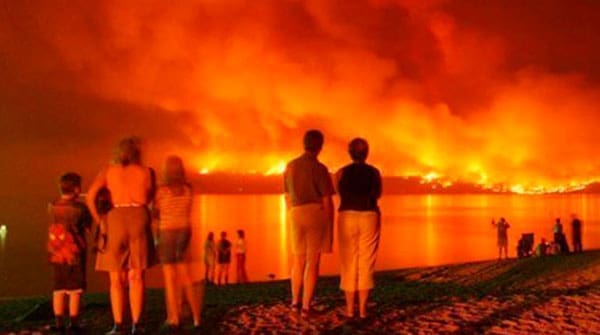Canadian fossil fuels are pouring fuel on both the unprecedented wildfires plaguing Canada and the climate change crisis
 Canada is burning. Unprecedented wildfires raging from coast to coast have forced tens of thousands of people out of their homes and smothered our cities with toxic smoke.
Canada is burning. Unprecedented wildfires raging from coast to coast have forced tens of thousands of people out of their homes and smothered our cities with toxic smoke.
Our leaders are looking for scapegoats. In Ontario, Premier Doug Ford has blamed wildfires on campers and lightning. In Alberta, Premier Danielle Smith blamed arson.
But even if true – the arson claim is particularly dubious – those are proximate causes. That means that regardless of the specific triggers behind this recent spate of fires, the fact that they have spread so much faster and grown so much larger than in the past is due to underlying conditions.
Specifically, the unusually hot and dry weather plaguing the country has put Canada on track for its worst-ever wildfire season. As unusual as it may seem, however, these conditions are precisely what climate scientists have long warned would happen as the planet heats up.
 |
| Related Stories |
| A Q and A with skeptical environmentalist Bjorn Lomborg
|
| Canadian communities can’t wait for the state to lead on climate action
|
| The world is in for a major climate change catastrophe
|
As droughts and extreme heat become more common, ever-greater swaths of land will catch fire every year. And in a cruel irony, those fires will produce even more of the greenhouse gas emissions that are heating up our planet.
The costs are enormous. When you add up property damage, lost productivity and health impacts, the 2016 Fort McMurray wildfire had a price tag of $9 billion alone.
Throw in floods, droughts and other extreme weather events, and the Canadian Climate Institute estimates that climate change is already costing the Canadian economy more than $20 billion per year. That figure will rise to $100 billion per year by mid-century if we don’t do something about it.
So what exactly can we do? It comes down to adaptation, preparation and mitigation.
Adaptation means responding to the climate crisis on the ground. We need more resources to fight fires and to protect our homes, roads, power lines and other infrastructure. We also need plans to protect the health and well-being of the marginalized groups most vulnerable to heat, smoke and other consequences of extreme weather.
Preparation means recognizing that the wildfires and other climate events we’ve experienced in recent years are not unlucky, once-in-a-century crises. Indeed, they are only going to get worse. Climate resilience must be a central consideration for all new infrastructure, investment and public policy moving forward.
Mitigation means reducing the greenhouse gas emissions that are driving the climate crisis. We can’t turn back the clock on climate change, but we must do everything in our power to stop it from worsening. We can do that by cutting carbon and methane pollution.
And that means phasing out the production and consumption of fossil fuels.
Canada is already taking steps to wind down oil and gas consumption. Battery-electric vehicles and heat pumps powered by a clean electricity grid will do a lot of the heavy lifting in the coming decades. Industry is testing new tools and techniques for reducing emissions, such as electric arc furnaces for steel production.
Yet Canada remains stubbornly committed to producing oil and gas for export as if we are neither responsible nor affected by our fossil fuels being burned elsewhere. That’s not how climate change works. It’s a global problem that requires every country to tackle its fair share of emissions.
In fact, emissions from Canadian oil and gas companies have been linked directly to the hot, dry conditions underlying the severity of recent wildfires. Instead of throwing more fuel on those fires, Canada should be aggressively transitioning out of oil and gas production and into cleaner, future-oriented industries.
It won’t be easy, cheap or quick. We may have to drag other countries, kicking and screaming, with us.
But when you’re in a sinking boat, you either plug the hole or start bailing water. You don’t stand around pointing fingers.
Hadrian Mertins-Kirkwood is a senior researcher at the Canadian Centre for Policy Alternatives. He focuses on climate change and industrial policy.
For interview requests, click here.
The opinions expressed by our columnists and contributors are theirs alone and do not inherently or expressly reflect the views of our publication.
© Troy Media
Troy Media is an editorial content provider to media outlets and its own hosted community news outlets across Canada.

